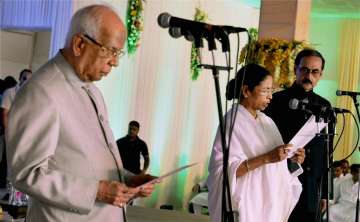Did Mamata Banerjee commit a mistake by invoking “Ishwar and Allah” in place of “God” in her oath?
Mamata Banerjee used the term “Ishwar and Allah” in place of “God” and it was good enough a deviation to generate a huge debate in political and legal circles.
New Delhi: West Bengal Chief Minister Mamata Banerjee is known to be very cautious while making public statements and she is known to measure the impact of every word before she utters it.
However, while taking oath as West Bengal Chief Minister for her second term, Mamata Banerjee used the term “Ishwar and Allah” in place of “God” and it was good enough a deviation to generate a huge debate in political and legal circles.
First of all, let’s have a look at the format of the oath of office and secrecy for a minister under Schedule 3, Para V & VI of Indian Constitution:
“I, A.B., do swear in the name of God/ solemnly affirm that I will bear true faith and allegiance to the Constitution of India as by law established, 1 [that I will uphold the sovereignty and integrity of India,] that I will faithfully and conscientiously discharge my duties as a Minister for the State of ..........and that I will do right to all manner of people in accordance with the Constitution and the law without fear or favour, affection or ill-will.”
“I, A.B., do swear in the name of God/solemnly affirm that I will not directly or indirectly communicate or reveal to any person or persons any matter which shall be brought under my consideration or shall become known to me as a Minister for the State of ....................except as may be required for the due discharge of my duties as such Minister.”
Clearly it has to be either ‘in the name of God’ or ‘solemnly affirm’. The use of the term “Ishwar and Allah” while taking oath was hitherto unheard in India.
Political pundits point out that it was a deliberate move on part of Mamata Banerjee aimed to send out a strong signal to the Muslim community of the state which has voted overwhelmingly in favour of her party in these elections.
In West Bengal, Muslims constitute 27% of the electorate and Mamata has emerged as the most preferred political leader among this community.
Whatever be the reason, the moot question is whether she committed a mistake by deviating from the set format. Can it be challenged in a court of law? Are there similar precedents from the past?
Yes, there are precedents. Instant parallels were drawn with the goof-ups of Late Chaudhary Devi Lal, the former Deputy Prime Minister of India as well as Barack Obama, the serving US President.
When the V P Singh led National Front was voted to power in 1989, Chaudhary Devi Lal was inducted in the cabinet and he was designated as the Deputy Prime Minister.
Chaudhary Devi Lal, however, even took the oath as Deputy Prime Minister which was seen as going against constitutional provisions. It was pointed out at that time that the Indian constitution had no provision of 'Deputy Prime Minister' in the ‘form of oath’ as prescribed in the Third Schedule under Article 75(4) of the Constitution.
A similar controversy erupted in United States when Barack Obama had to take the oath for a second time during his first term as the President of the United States. It was done because in his oath, President Barack Obama said a word that was out of sequence.
Actually, the then Chief Justice of United States John Roberts who administered the oath of office to President Barack Obama accidentally switched the word order when he administered the oath.
In place of saying, "I will execute the office of president to the United States faithfully," he said, "I will faithfully execute the office of president of the United States." And Barack Obama repeated the same.
After the officials realised the incorrect sequence, they advised the president to take the oath again so that its validity could not be challenged in a court of law.
It was not such a big deviation but “out of an abundance of caution”, as the statement from White House read, Chief Justice John Roberts administered the oath of office to President Obama for a second time.
Constitutional expert Shishir Tripathi, as quoted by Firstpost, is of the opinion that one should not take liberties with the oath and that a writ of ‘quo warranto’ can be issued in such case where the oath is not administered properly.
However, In view of a majority of the constitutional experts, anybody has the freedom to approach a court of law but the Supreme Court in its order relating to Devi Lal’s case had already said that such deviations don’t make an oath unconstitutional.
Dismissing a petition relating to this matter in January 1990, the Supreme Court pointed out that the description of Devi Lal as Deputy Prime Minister does not confer on him any powers of the Prime Minister.
Recalling the apex court’s verdict in Devi Lal’s case, veteran constitutional expert Subhash Kashyap says that there is no anomaly in the oath of Mamata Banerjee.
“Well, it will be better if everybody takes oath in the prescribed format but unless there is a ‘substantial’ difference, it does not make any difference. The Supreme Court had settled the matter in Devi Lal’s case,” Subhash C Kashyap said.
P P Rao, Senior lawyer of Supreme Court of India, also dismisses the speculation over the constitutional validity of Mamata Banerjee’s oath and points out that even Mahatma Gandhi referred to God as “Ishwar and Allah”.
“The oath of Mamata Banerjee can’t be challenged in a court of law. Even Mahatma Gandhi used to chant “Ishwar-Allah tero nam”. Some people refer to God as “Ishwar” while some other describe him as “Allah”. Therefore, there is nothing unconstitutional in it,” P P Rao said.
